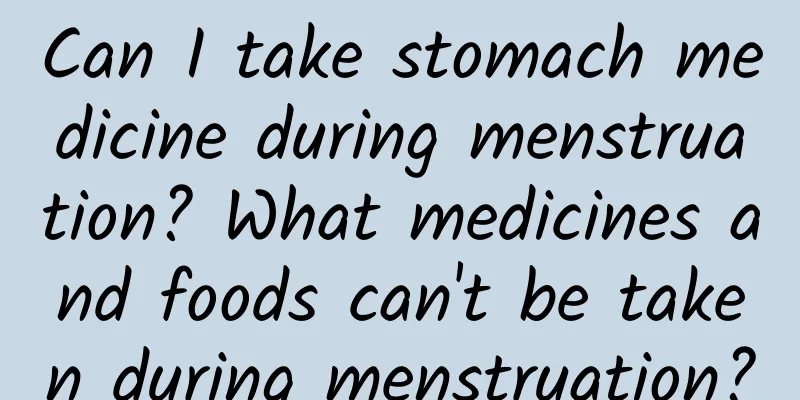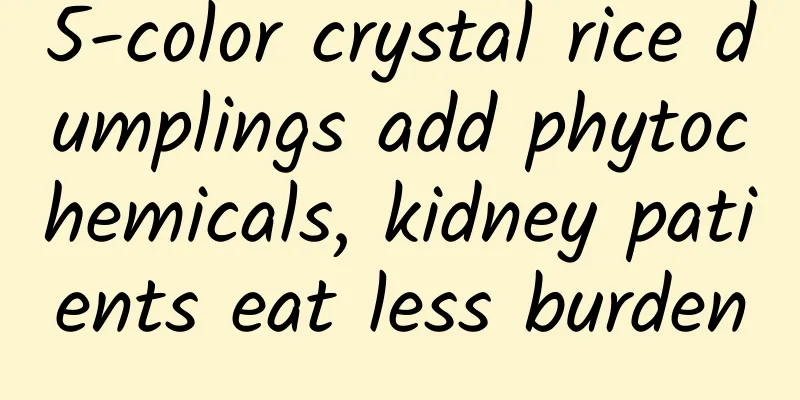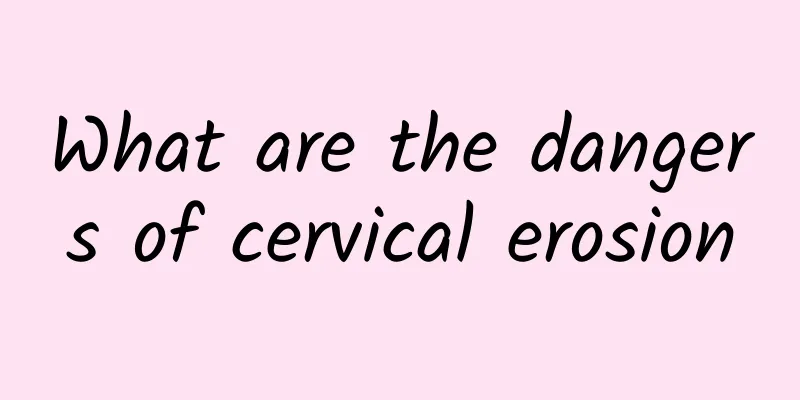Can I take stomach medicine during menstruation? What medicines and foods can't be taken during menstruation?

|
Generally speaking, you can take stomach medicine during menstruation, but try to take medicine under the guidance of a doctor. After all, everyone's physique is different, so the body's reaction to the medicine is also different. During menstruation, you should pay attention to keeping warm, avoid cold, cold, raw, and cold stimulation, and prevent the invasion of cold evil; pay attention to rest, reduce fatigue, strengthen nutrition, and strengthen physical fitness; try to control drastic mood swings, avoid strong mental stimulation, and keep a happy mood; usually avoid excessive sexual intercourse, and sexual life is absolutely prohibited during menstruation. The medicines that cannot be taken during menstruation are: 1. Blood-activating and blood-stasis-removing medicine. 2. Menstrual regulating drugs. 3. Hemostatic drugs such as Anluoxetine and vitamin K can reduce the permeability of capillaries and cause capillary contraction, which can cause menstrual bleeding. In addition, Chinese medicine or Chinese patent medicine with strong hemostatic effect should be used with caution. 4. Hormone drugs. 5. Local medications for the treatment of gynecological infectious diseases, such as vaginal trichomoniasis or fungal infections, washes, vaginal tablets, pills, suppositories, capsules, etc. 6. Laxatives such as magnesium sulfate and sodium sulfate have a strong laxative effect and can cause reflex pelvic congestion. Thyroxine preparations may cause menstrual disorders and should be avoided during menstruation. 7. Diet pills often contain ingredients that suppress appetite. If used during menstruation, they may cause menstrual disorders, polyuria or difficulty urinating, or palpitations, anxiety, and even worse, amenorrhea. Foods that cannot be eaten during menstruation During menstruation, you should pay attention to diet regulation. Avoid eating raw, cold and cool foods before and during menstruation to avoid cold stagnation and blood stasis which may aggravate dysmenorrhea. Those with heavy menstrual flow should not eat spicy and dry foods to avoid heat forcing blood circulation and causing more bleeding. 1. Caffeinated beverages: They cause breast pain, anxiety, irritability and mood swings. They also consume vitamin B stored in the body and disrupt carbohydrate metabolism. 2. Alcohol: Alcohol will consume the body's vitamin B and minerals. Excessive drinking will disrupt carbohydrate metabolism and produce too much estrogen, causing early menstruation and excessive menstrual flow. 3. Cold drinks: People with cold menstrual diseases should avoid drinking them. 4. Tea: Women lose a lot of iron after menstruation, so they should take more iron supplements. Tea contains more than 30% tannic acid, which is easy to combine with iron ions in the intestines to produce precipitation, hindering the absorption of iron ions by the intestinal mucosa; it can cause breast pain, consume vitamin B stored in the body, and destroy carbohydrate metabolism. 5. Soft drinks: Many women who like to drink carbonated drinks will feel tired and lack of energy during menstruation, which is a manifestation of iron deficiency. This is because most soft drinks contain phosphates that react chemically with iron in the body, making it difficult to absorb iron. In addition, drinking too much carbonated drinks will neutralize the sodium bicarbonate in the carbonated drinks with gastric juice, reducing the digestive ability and sterilization effect of gastric acid, and affecting appetite. 6. Sichuan pepper, cloves, and pepper: During menstruation, you should eat light, plain, nutritious foods. Avoid eating spicy foods that are highly irritating, so as not to cause early menstruation and excessive menstrual flow. 7. Crabs and snails: Women should avoid eating raw, cold foods during menstruation, especially those who suffer from cold dysmenorrhea. 8. Persimmon: Persimmon contains tannic acid, which easily combines with iron and hinders the body's intake of iron in food. Since women lose a lot of blood during menstruation and need to supplement iron, they should not eat persimmons. |
<<: What is the cause of menstrual diarrhea? What to do if you have menstrual diarrhea
>>: 46 years old, my period has come for half a month and it is still not over. What's wrong?
Recommend
What are the treatments for patients with cervical erosion?
Excessive vaginal cleaning or multiple abortions ...
What fruits can't be eaten for uterine fibroids? Top 10 taboo foods for uterine fibroids
What fruits can't be eaten for uterine fibroi...
How to effectively prevent vulvar itching
The prevention of vulvar itching is of great conc...
Will eating hawthorn cause miscarriage? Don’t eat too much
Many women like to eat sour foods during pregnanc...
What should I pay attention to after ectopic pregnancy surgery?
Ectopic pregnancy is mostly caused by blockage of...
What are the common symptoms of ovarian cysts in women?
What are the common symptoms of ovarian cysts in ...
What are some of the complications that occur after a miscarriage?
Nowadays, many women choose to have an abortion a...
I have stomach pain but my period has not come. What's going on?
What's going on when I have stomach pain but ...
Prevention of cervical hypertrophy starts from daily life
There are many gynecological diseases in women, a...
Ovarian cysts can torsion
Ovarian cyst pedicle torsion is one of the more s...
Experts analyze the symptoms of cervical erosion
Many people want to know the symptoms of cervical...
Which hospital is best for treating hyperprolactinemia?
Hyperprolactinemia must have caught many patients...
What are the symptoms of threatened miscarriage during mid-pregnancy?
What are the symptoms of threatened miscarriage i...
Diseases of affluence are caused by eating! 3 tips for eating hotpot to keep away from gout
The temperature has dropped sharply and the weath...
What should I do if I have irregular menstruation and prolonged bleeding?
What should I do if I have irregular menstruation...









